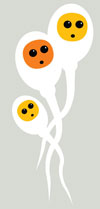sierraclub.org - sierra magazine - jan/feb 2013 - grapple: next big thing: sperm?
Record Arctic Melt | Critter: Fish-Hunting Cat | Next Big Thing: Sperm? | Graphic: Wolves vs. cows | Up to Speed
In the future, sperm will solve all our problems?

IS THAT A POLYP IN YOUR POCKET? When the moon is full and the tide is right, a coral's thoughts—to the extent that corals can be said to have thoughts—turn to love. In the marine equivalent of a hot tub orgy, coral colonies release sperm and eggs in a briny bacchanal. Reproductive biologist Mary Hagedorn of the Smithsonian Institution tries to be there during those intimate moments, using a vial to gather up ejaculate for the world's only coral sperm bank. She has frozen roughly a trillion coral sperm so far, part of an effort to preserve the crucial genetic diversity of the world's disappearing coral reefs in the face of threats from pollution, overfishing, and ocean acidification.
SPEEDY DELIVERY How to deliver donated sperm in a low-carbon manner? Seattle's Sperm Lab gets semen to nearby fertility clinics via a bike shaped like a large white spermatozoon. The bulbous head holds a liquid nitrogen-lined freezer compartment for keeping the precious fluids in tip-top shape, while the tail gives the cycle a frisky flair. The sperm bike's low-carbon footprint may not compensate for the resulting crop of new humans, but it does lend cycling a virile image.
SNOT TONIGHT, DEAR North America's largest amphibians, known as hellbenders or devil dogs, are sadly no longer hell-bent on reproduction. (Perhaps it has something to do with their third nickname: snot otter.) Having survived from the Jurassic period, the two-foot salamanders began declining precipitously in the mid-1990s and are now functionally extinct in most of the streams where they used to thrive. For the past few years, researchers have been gathering hellbender milt and storing it frozen for a more fecund future. "It's a hedge against losing genetic diversity," explains Dale McGinnity of the Nashville Zoo, who developed the unique sperm bank with biologist Robert Browne. —Dashka Slater
Wolves vs. cows